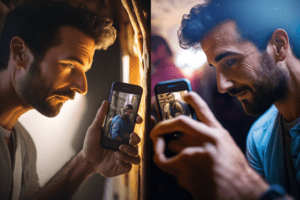Breaking the Loneliness Epidemic: The Struggle of American Adults to Find Friends
True companionship is crucial for a life well-lived, granting us the sense of love and community that we crave. Unfortunately, as our world becomes more complex and fast-paced, connecting with others authentically is harder than ever before—especially for adults in midlife who often find themselves struggling to establish meaningful relationships.
In his 2017 Harvard Business Review article, Surgeon General Vivek Murthy stated that loneliness is a growing health epidemic in the United States. Astonishingly, reports of feeling lonely have doubled since the 1980s; an astounding 40% or more Americans are now affected. Furthermore, studies further suggest that this number may be even higher than what we think!
The COVID-19 pandemic has caused a great deal of distress, with many people becoming increasingly separated from their families and friends due to the need for social distancing. Sadly, this is not an uncommon occurrence in today’s world where long hours are spent staring at screens rather than having meaningful conversations or building relationships. Lockdowns have only exacerbated this problem further by limiting our already limited opportunities to connect.
While the intricacies of loneliness are still not entirely known, innovators and techies alike have commenced exploring potential solutions. One concept is to employ technology for platonic connections as it has done in revolutionizing dating apps’ search for romantic relationships. Keep reading to learn more about breaking the loneliness epidemic and the struggle of American adults to find friends.

The Power of Technology in Combating Loneliness: A Potential Solution to the Epidemic
The idea of developing friendships through technology is a fairly new development, but it has become increasingly popular in the last few years. According to The Hustle newsletter’s recent report, platonic relationship apps could be the next big thing within the multi-billion dollar internet dating industry.
The report’s author, Sara Friedman, uncovers the sobering statistic that not only has the average American failed to make a new friend in five years, but 22 percent of millennials claim they have no friends at all. This alarming trend necessitates fresh solutions to foster genuine emotional connections with others. To this end, platonic relationship apps are designed to bridge individuals who possess common interests and aspirations through technology-enabled matchmaking services – thereby facilitating close relationships centered around meaningful interactions.
Despite the lingering doubts about technology’s capacity to forge authentic human connections, many users of these programs have good experiences and even build close relationships with others.

Final Thoughts
America is currently struggling with the ever-growing issue of loneliness, and a solution cannot be found through technology alone. Fortunately, platonic relationship apps are providing an unprecedented and inventive way to help people create connections that go beyond surface level interactions. Spinnr is an obvious winner in this category since it was built during the pandemic and focuses on creating meaningful, and authentic relationships.
To battle feelings of isolation and foster meaningful relationships, remember to combine tech with face-to-face contact. Technology should bolster our existing connections instead of supplanting them; thus, the key lies in actively engaging with others and welcoming new ones into our lives. Taking initiative is critical for forging satisfying bonds – both virtual and corporeal!
To sum up, while technology can’t completely conquer loneliness alone, it can most certainly aid in fostering new relationships and promote meaningful connections. The potential of platonic relationship apps appears to be limitless; as they advance over time, so too will their impact on defeating the growing epidemic of isolation in America.
How will you use technology to make new friends? Let us know in the comments below!

Amazing article, it really caught my attention.